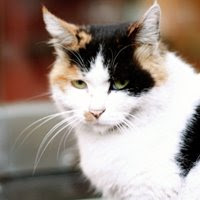
Another beloved teacher dead last Sunday, I just knew by email.
He is a great man, really teaches me a lot of things.
It was at first
John Thow, then now Jorge... T.T
Composer Liderman dies in apparent suicidehttp://www.sfgate.com/cgi-bin/article.cgi?f=/c/a/2008/02/04/BAFGURL71.DTL(02-03) 23:26 PST El Cerrito -- A 50-year-old man who was struck and killed by a train in BART's El Cerrito Plaza Station on Sunday morning has been identified as Jorge Liderman, a prominent local composer and a professor in the music department at UC Berkeley.
Liderman was struck by a Richmond-bound train at 9:42 a.m. in what appeared to be a suicide, said BART spokesman Linton Johnson.
"It's still under an investigation," Johnson said.
Liderman was a fixture on the Bay Area's classical music scene since joining the Berkeley faculty in 1989. His music - full of melody, rhythmically vital and scored with a keen ear for instrumental color - was performed regularly both here and abroad, and his discography included almost a dozen CDs.
"Furthermore," a chamber concerto that Liderman wrote for violinist Carla Kihlstedt and the San Francisco Chamber Contemporary Music Players, is scheduled for a world premiere at 8 p.m. today at the Yerba Buena Center for the Arts.
Adam Frey, the group's executive director, said that Liderman had been expected to speak at a public run-through of the piece Sunday afternoon but did not appear. He said Liderman had attended a rehearsal as recently as Friday.
Johnson said there was no one else on the BART platform when the incident occurred and that the only witness was the train operator. The operator reported that he saw a man standing on the yellow tiles at the edge of the platform and that he honked several times, Johnson said. When the train came to within 5 feet of the man, he jumped in front of the train, Johnson said.
In recent years, Liderman's work had been showing up on concert programs with ever-greater frequency. In March, the New Century Chamber Orchestra gave the world premiere of "Rolling Springs," and in November, Cal Performances marked the composer's 50th birthday with a concert dedicated to his chamber and vocal music.
Much of his music, including the orchestral work "Barcelonazo" and an hourlong setting of "Song of Songs" that was premiered in Berkeley in 2002, was influenced by the sounds of his native Argentina and by his Jewish roots. He also drew on the models of Stravinsky and Bartók, as well as more recent masters like György Ligeti and Steve Reich.
Among his major compositions was "Antigona Furiosa," a 1991 chamber opera that relocated the story of Sophocles' "Antigone" to the period of military rule in Argentina.
Liderman was born in Buenos Aires in 1957, the grandson of European immigrants. He studied electronics in high school, but soon found himself drawn to music. In an interview last year with The Chronicle, he cited a teenage encounter with the music of tango composer Astor Piazzolla as a formative experience.
"I was blown away," he said. "If I had to pick a moment where I thought, 'I have to become a composer,' that would be it."
Liderman attended college in Jerusalem, then came to the United States to earn a doctorate in composition at the University of Chicago. He joined the UC faculty immediately afterward.
Despite feeling not entirely at home in academia, Liderman was a dedicated teacher to a generation of student composers.
"The challenge of a composition teacher," he said, "is to try to understand what the student is trying to do and help them to do it in the best possible way - sometimes even making them aware of what they are trying to do in the first place."
Liderman is survived by his wife, Mimi, of El Cerrito.

